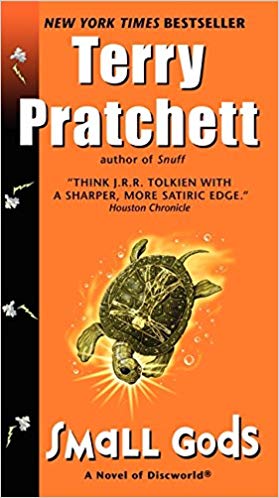 Small Gods, Terry Pratchett
Small Gods, Terry Pratchett
To the extent there is a theme in Terry Pratchett’s books it could probably be summed up as this: people should be more or less be left alone to live their lives and make their decisions. It won’t be ideal or utopia; humans will probably muck things up. But we should allowed to muck things up in our own way. It’s not to say that he’s libertarian, this isn’t about anything so pedestrian as specific laws, but that people are ends in and of themselves, not means to someone else’s ends, and it’s wrong to force them into your own story. In Discworld the villains are most likely to be clerics and priests, political leaders, or even fairy godmothers, who want to force everyone else to be part of their destiny or ideology, who only see people as bit players in their own story. The other theme is that stories have a way of trying to lead their own lives, too.
Discworld has touched on the story of Gods before. They’re very much a part of Discworld, and live in their home on the tallest mountain, Cori Celesti. As Pratchett likes to play around with stories and myths from any place that catches his fancy, the Discworld Gods tend to be a mishmash of Greek and Roman and Egyptian and Voodoo and animist and any other thing. (According to Discworld, there are at least 3,000 Gods on Discworld and people are discovering new ones every day.) In Small Gods we learn that the Gods pop up here and there, but their lifeblood is belief. If they can catch one believer they can exist; with more believers they can gain in power; with no believers they blow away into the desert. And belief is tricky, as we find. It doesn’t mean following the rules; it doesn’t necessarily mean believing in the rituals or idols or going to Church/temple/etc and saying you believe. It means Belief.
The formerly powerful god Om inspired a grand civilization of Omnian, one which bears striking similarities to the most restrictive and torture heavy versions of Christianity. And despite the fact that there is a major civilization with pilgrims coming from around the world and monasteries and monks and a Quisition dedicated to making sure there aren’t any other religions around, belief in Om, rather than the Quisition and clerics, is not there. Which means that when Om tries to manifest himself as a bull for one of his periodic visits to Earth, he instead ends up wandering the Disc as a tortoise almost entirely powerless until he finds Brutha, the one actual Believer left in Om.
From there we’re off, with Brutha and his prodigious memory unwillingly taking part in palace intrigue, the head of the Quisition, Vorbis, and a nascent rebellion, facing off, and war with an Athens type stand in. Through this we have those who continue to try to fight for not just themselves but the truth or the glory or a greater story, while at the same time others just try to keep putting one foot in front of the other and doing what they think they should. In Discworld there is no greater act than doing things because it feels like the right thing to do, with the general idea that people will more or less try to do the right thing, with cruelty being what needs elaborate justifications, philosophies or ideologies.
What we learn through this book, our main message, is one that should be no surprise to those who are fans of Good Omens. Simply this, that for all of us, the moral should be:
- This [life] is not a game.
- Here, now, you are alive.
And we can all go and figure it out from there. A good lesson for us all, and I would say a much more fun discourse on belief than all the treatises on clericalism one could find.
Filed under: Book Reviews, books, discworld, fantasy, religion | Tagged: book reviews, books, discworld, Ethics, religion, small gods, terry pratchett | 1 Comment »

